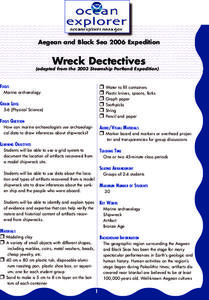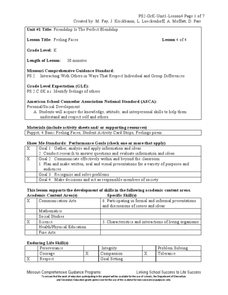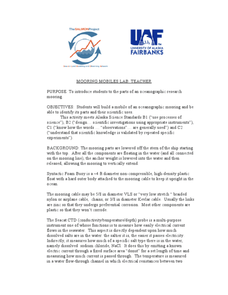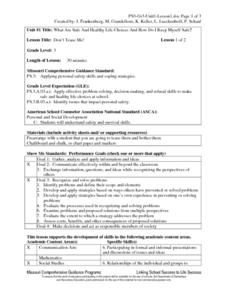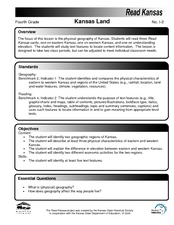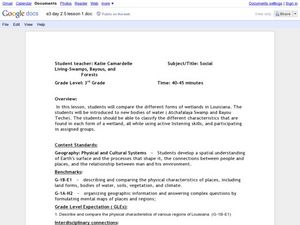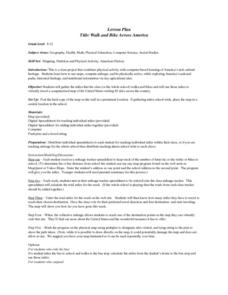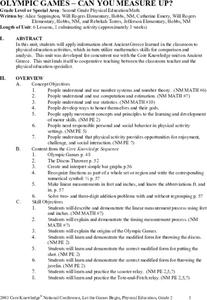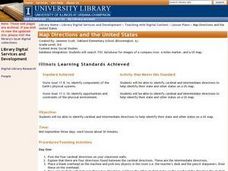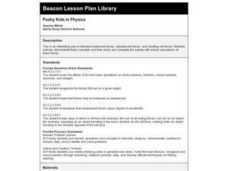Curated OER
Wreck Detectives
Junior archaeologists examine types of artifacts from the Bronze Age on the internet. In collaborative groups, they create a story about a ship from this period and then construct a model of the ocean floor after their ship has sunk....
Curated OER
Feeling Faces
Students explore their feelings. They listen to poems for emotions and complete the basics feelings activity sheet.
Curated OER
Celebrate Your Culture
Third graders share some special occasions/events observed by their families/neighborhoods, and special activities/traditions connected with the event. They identify their own culture's customs and those of others.
Curated OER
Agriculture in Your Life
Students examine the agricultural sources of everyday products and identify food products outside traditional farming circles. They discuss the background information, and complete activity sheets, locating various commodity locations on...
Curated OER
Scarcity of Land Throughout the World and in Hawaii
Students discuss the importance of "land." They review the four types of land classification--urban, rural, agricultural and conservation--and participate in an activity involving an apple that demonstrates the use of land in Hawaii....
Curated OER
Mooring Mobiles Lab
Oceanography experts use candy to construct a model of a bio-physical mooring that would test a variety of factors. Each piece of equipment to be included on the mooring is described within the write-up. As pupils gather the candies for...
Curated OER
Don't Tease Me!
Third graders observe as the teacher pretends to tease a student and try to describe what the problem is. They brainstorm times when they felt unsafe at school either physically or emotionally and write down their responses on the board...
Curated OER
Urban Ecosystems 2: Why are There Cities? A Historical Perspective
Second in a series of five lessons, this lesson encourages preteens to consider cities as urban ecosystems. First, they keep a food diary for a few days. They visit the Natrional Agricultural Statistics Service website for current data...
Curated OER
Summertime Travel
Third graders write about a summer event they participated in. In this paragraph writing lesson, the teacher models how to write about a place they have visited. Students then write their own paragraphs. Students will point out on the...
Curated OER
Chemistry - Science 10
In this chemistry science worksheet, students identify the parts of a chemical reactions. Students name the major particles of the atom. Students apply knowledge about the atom, theories, and models.
Curated OER
Kansas Land
Fourth graders discover the geographic regions of Kansas. In this geography lesson, 4th graders explore the different regions of Kansas and determine how the different geography affects daily life in Kansas.
Curated OER
Living Swamps, Bayous and Forests
Third graders explore interesting environments by exploring Louisiana. In this wetland lesson plan, 3rd graders utilize the web to research the State of Louisiana, the bayous in the area, and the Gulf of Mexico. Students write a journal...
Curated OER
Walk and Bike Across America
Young scholars learn how to use maps, compute mileage, and be physically active while exploring America's national parks, historical heritage, and nutritional information via key agricultural sites.
Curated OER
Arbor Day Across the United States
Students perform research about hardiness zones used to guide planting. They read a hardiness zone color-key map and create their own color-key maps to show when different states celebrate Arbor Day.
Curated OER
Poster Fitness
Seventh graders conduct internet research to gather information about physical fitness, and create individual posters to describe what personal fitness means to them. Student include both clipart and hand drawings to create collages.
Curated OER
Design Your Own Rube Goldberg Machine
Learners participate in a culminating activity for a unit on Energy and Simple Machines. They are challenged to incorporate simple machines in to a complex mechanical system. While designing and testing their machine they will also...
Curated OER
Human Anatomy- How Do We Move?
Students examine the muscular system. In this muscular system lesson, students first draw a realistic representation of their leg or arm bones. Students do several activities to attach these bones to "joints" with string to simulate the...
Curated OER
Solutions and Suspensions
Students explore matter by conducting an in class demonstration. In this liquid mixture lesson, students identify the difference between a solution in which a solid dissolves into liquid, and a suspension where the solid doesn't dissolve...
Curated OER
Olympic Games - Can You Measure Up?
Students complete 6 units to learn about Ancient Greece and the Olympic games through physical education activities as well as math activities. In this Ancient Greece lesson, students complete multiple activities in 6 lessons including...
Curated OER
Journey to Japan: An Elementary Geography Standards-Based Unit on Japan
Second graders compare and contrast Japanese customs and culture to those of Americans through research in this year long study. They determine the basic needs of all people in spite of cultural differences.
Curated OER
Map Directions and the United States
Third graders search TDC database for images of a compass rose, a miles marker, and a US map. They identify cardinal and intermediate directions to help identify their state and other states on a US map.
Curated OER
Where the Red Fern Grows: A 4th Grade Literary Focus Unit
Fourth graders explore the human and animal connection along with the idea that death is a part of the life cycle. They read "Where the Red Fern Grows." Students examine the feelings and emotions surrounding death and they discover the...
Curated OER
MINI-UNIT on ELECTRICITY
Young scholars identify hypotheses related to static electricity, to begin to test the hypotheses, to begin to develop conclusions related to observations, to demonstrate that like charges repel and unlike charges attract each other, to...
Curated OER
Pushy Kids in Physics
Students examine the concepts of balanced forces, unbalanced forces, and resulting net forces. They participate in a force and motion demonstration by pushing students in various directions, and calculating and identifying the resulting...


